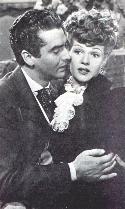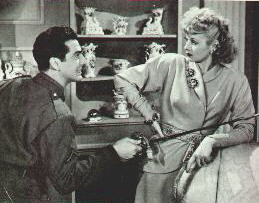

To Mature's credit, he handled his cardboard role in My Gal Sal with gusto. The critics, who would never be Victor's fans, were actually cordial to his performance. "Victor Mature, of all people, plays the central role of Dresser. Believe me or not, he plays it with remarkable assurance and manages to get away with instrumental playing and singing with a minimum of awkwardness." (New York Herald-Tribune). Said Time Magazine, "Although one of Hollywood's almost unbearably beautiful young males, Victor Mature plays the Dresser role, he is generally bearable."
Hedda Hopper once wrote, "In a town fraught with people who think they have I.Q.'s of 275 plus, Vic frankly admitted that he was a genius. That coy declaration got him reams of publicity from people irritated by the very thought of a 'ham' actor's having such an opinion of himself!" Victor also bought a Boxer dog, named him Genius, and acquired coveralls for the crew of his next picture with "Assistant Genius" stitched on their backs. Miss Hopper referred to Victor's antics as a "burlesque of pomposity." At another time, because he had not been asked to record for posterity his foot and hand prints in a block of cement in front of Grauman's Chinese Theatre on Hollywood Boulevard, Victor poked further fun at filmland's traditions by having concrete poured into a square in front of his dressing room. With reporters and photographers at the scene, he took down his trousers and gingerly imprinted the fresh cement with the outline of his behind. Studio heads, however, prevented the story or photographs from reaching the newspapers.
When Mature spread word to the press that he was considering the purchase of Valentino's home, "The Falcon's Lair," a good friend of the dead idol made several acid comments regarding the proposed real estate transaction. Those comments were headlined in the press with, "Pola Negri Says Mature Not the Type to Play Valentino Role." None of this, however, seemed to bother Vic. As Hedda Hopper explained, "That's what he wanted. He didn't care how loudly people screamed, just so as they screamed Mature--first name, Vic." One of those to yelp the loudest in print was W.H. Mooring, the Hollywood correspondent for the British Picturegoer Magazine. He informed his readers that Mature was not a favorite in the tinsel town, and that indeed the man had deliberately set out "to become Hollywood's self-avowed disciple of conceit and vulgarity."
In his next film, Footlight Serenade (Twentieth Century-Fox, 1942), Victor is Tommy Lundy, the world's heavy weight boxing champion, large on muscle, conceit, and boast, but small on brains. He is bare-torsoed throughout much of the picture, as is top-billed over co-star John Payne, his sparring partner in a Broadway musical in which the Champ finds himself. When Victor makes passes at the show's star (Betty Grable), he is angrily confronted in the onstage ring by his sparring mate, who also happens to be secretly wed to spunky Betty. The black-and-white film is not memorable for either its flimsy plot (even The Prizefighter and the Lady, MGM, 1933, with Myrna Loy and Max Baer was more fun) or its dull songs ("I'm Still Crazy for You," "I Heard the Birdies Sing," etc.) According to Newsweek Magazine, the picture's high spot is "probably Mature's confident interpretation of the brash, immature lady killer. While there are those who will discount this performance as a triumph of type casting, Mature manages the role with the saving grace of humor and self-kidding."
Victor's obligatory loanout to RKO came in the form of a not-very-funny comedy with music called Seven Days' Leave (1942), in which he is an Army corporal (with hair cropped to Army brevity) on furlough who must marry the high-brow daughter (Lucille Ball) of a wealthy family before he can collect a hundred-thousand-dollar inheritance. The film was judged as having "a B picture atmosphere which it never quite shakes off" (New York Sun). The procedures were laced with specialty acts performed by Ginny Simms, Harold Peary, Marcy McGuire, Arnold Stang, the orchestras of Freddy Martin and Les Brown, and the "Truth or Consequence" show of Ralph Edwards and his company. Few people were impressed by this hodgepodge show, and in this stint away from the Fox home lot Victor was panned by the critics. "Mature is still knocking the dames dead (that's what the script sez), and he's over-acting (which the script doesn't say) with his utterances of the inane dialog" (Variety).
Poor notices for Seven Days' Leave hardly bothered Victor, for he had other items on his mind. For one thing, he confessed to newsmen, "I haven't arrived yet. You know how I know this? It's because other players in this studio [Twentieth Century-Fox] don't invite me to their parties.
"To be invited to parties in Hollywood, you have to amount to something. You have to be important. I will know when I am important when I am invited to parties."
On the same subject, Victor added that when success did hit, he intended to be a regular guy. "I don't want to get that front, that attitude which demands front tables in clubs, which causes one to forget one's early friends. I know I can keep on being regular."
No sooner was Seven Days' Leave in the can, than Victor joined the United States Coast Guard, on July 2, 1942, as a Seaman Second Class. Although he was under subpoena to appear at a court hearing in which his wife sought a temporary alimony of $510 monthly pending trial of a divorce suit, he reported for duty at San Pedro California. (On February 7, 1942, when it was made public that the Matures were on the verge of a divorce, Martha announced, "This is the first time I've heard about it. If you hear anymore, let me know.") His wife's attorney charged that he had enlisted as "a convenient out." Later in the year, Victor's request for a transfer to Connecticut was granted, and Rita Hayworth, against her employers' orders, rendezvoused with him there. He gave her a diamond and ruby ring before setting sail for active convoy duty in the North Atlantic.
On February 10, 1943, Martha Stephenson Kemp Mature ended her marriage with a divorce in Las Vegas, Nevada. (On April 28, 1946, she would wed screen writer St. Clair McKelway.)
Meanwhile, Columbia's sex goddess Hayworth met Orson Welles, who was in Hollywood with his magic act. Rita toured servicemen's camps with him as part of the act in which he sawed her in half. On September 7, 1943, they were married. At a port off the frigid North Atlantic waters, Victor heard the news by radio. Although he was hard hit by the announcement, he quipped, "Now, I know that the way to a woman's heart is by sawing her in half." The words were repeated around the world and he became a figure of noble character to his shipmates who had earlier tagged him "The Beautiful Hunk of Junk."
After fourteen months of sea duty, Victor was returned to the States in June, 1943, where at Brighton Marine Hospital (near Boston, Massachusetts) he underwent dental surgery to extract two rear molars. It was also reported that while at sea he had sustained a slight injury to his right leg. That autumn he personally sold $270,000 worth of war bonds while on tour. He said, "They come from people who hear you tell stories about their sons and they buy bonds like crazy!"
Now a Chief Boatswain's Mate, Victor was awarded a commendation from Russell R. Waesche, Commandant of the U.S. Coast Guard, for outstanding work on the bondfront and battlefront, and was given a twenty-five-day leave, much of which was spent in Hollywood. Besides dating blonde actresses Betty Hutton, K.T. Stevens, and Veronica Lake, he was heard over NBC radio on the "Ginny Simms Show," when he introduced Coast Guardsmen Melvin Baldwin and Roy O'Malley, the lone survivors of the Escanaba, a cutter that was sunk by German torpedoes. He also appeared on "Lux Radio Theatre" on October 25, 1943, with Lana Turner and Gene Lockhart in an hour version of Slightly Dangerous, originally a MGM film of the same year that had starred Miss Turner with Robert Walker and Walter Brennan. Victor donated the salary he received from both shows to the Coast Guard Relief Fund. For this generosity, his leave was extended an additional five days, and during this period he met Anne Shirley, the actress ex-wife of John Payne. They saw each other every day and Miss Shirley told a reporter, "We'd like to get married before his leave's up, but we don't know where or when." Victor was then placed on shore duty and was assigned to play in the all-Coast Guard musical revue, Tars and Spars which opened in Miami, Florida in April, 1944.


